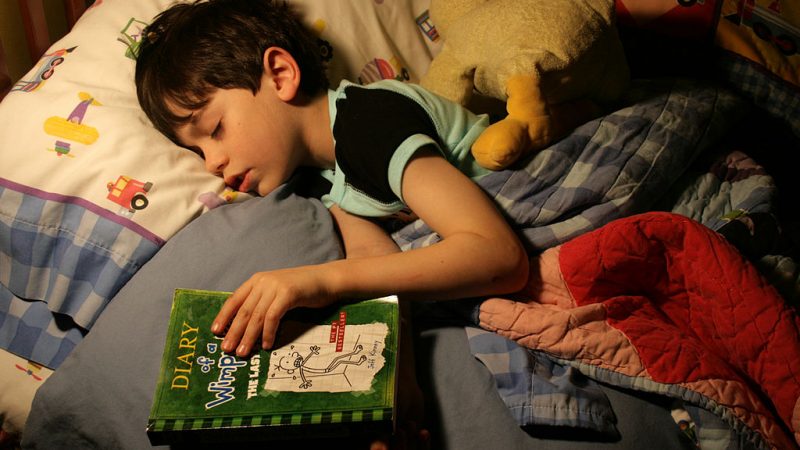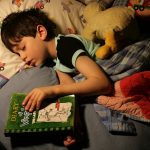
Bedtime Reading and Gender Stereotypes: a Q&A with Dr Lauren Spinner
Our Let Toys Be Toys -Parenting Science Gang members have been considering researching the effect bedtime stories have on children’s gender stereotyping.
Dr Lauren Spinner joined us for a Q&A to help us explore this idea.
Lauren Spinner: Hi everyone! I think this could be a really great project that you could lead on! It would be very difficult as a scientist to run without a dedicated group of parents, hence why any ‘intervention’ studies before have been on a very small scale (some only 8 participants!)
You would need to consider:
In practice, is this a viable study?
Lauren: For example, would you as parents be able to commit to reading a specific book with your child(ren) for a set number of weeks?
PSG A: Does it have to be every night do you think? Or just regularly through the week?
Lauren: I don’t imagine every night is necessary. Perhaps a couple of times a week for several weeks if possible. I can check other literature to see what they have done, but I definitely don’t think it would have been every day.
PSG B: I would struggle to impose a specific book on my kids. They are quite, er, opinionated.
PSG C: Same here!
PSG B: My kid rarely lets me choose the book! Plus I am a single parent so my kid isn’t with me every night of the week
Lauren: How old are your children? Because this is something to consider! How much they may challenge reading certain books – perhaps older ones would resist more?
PSG B: 4 and 7. Both are rather strong willed.
PSG C: Nearly 5. But he’s always been like this!
PSG D: If she liked it, my 4.5 year old would read it every night. If she didn’t there’s no way!
PSG E: Mine are 6 – one is behind the other on our school reading tree and they really don’t like reading the same books.
PSG B: My eldest might (note – might) agree to go along with it if told it was part of an experiment and I promised to explain all about it once it was over. The younger one wouldn’t though.
PSG F: If my 5 year old loves the book she’d probably happily read it every night for a few weeks at least but if she doesn’t then there’s no way I could make her listen to it!
PSG B: Ah. Just seen elsewhere about following up a month later. So a promise of an explanation won’t work 🙁
PSG A: If there were a selection of books to choose from would that help? Particularly if it didn’t need to be every night. I would like to think i could persuade my kid, not sure that’s true though!!
PSG E: we got our child who has to repeat all their twins reading books a few weeks later to do this by allowing them special choice of book that their sibling has never seen once a week. Worked a treat.
PSG G: Mine too. But when he does like something, he’ll keep asking for it!
What books would we choose?
Lauren: I think it would be important to have 3 conditions
- a gender stereotypic book (which is the ‘norm’)
- a counter-stereotypic book
- a book unrelated to gender (e.g. animals).
This would allow a full comparison.
And you would have to think carefully about what books might be suitable and consider the children’s age range
PSG H: The trouble with the book unrelated to gender is that most people would defer and make any characters male. It’s ingrained in us. So there would need to be very careful consideration about how to make a control group work.
PSG A: Perhaps a mix of genders doing something gender neutral?
PSG E: Do we have an age range for the kids? Or is it quite broad? Could there be a variety of books so not a set order of reading – that might help people who have kids that like to chose their own book?
Lauren: I think a selection of perhaps 3 books per condition could work. Would just have to check that they are similar enough to one another in terms of the message they are putting across (for experimental control)
PSG A: Maybe the books could be on a theme – like a book about dinosaurs as a male gender steroetype
But then people could pick something that is age / child appropriate
PSG I: Aren’t there a lot of variables that we can’t control? Like whether the child would prefer their own choice, how well the parent ‘reads’ aloud etc? Or maybe that wouldn’t matter?
PSG E: I was reading that paper about implicit messages & think this might apply to a book read by someone who didn’t believe the message in it.
Lauren: There would be variables that you cannot control, there always is, but as long as the guidelines for the procedure are very clear and people follow them as best they can they we can minimise any effect that other variables may have.
PSG A: So if we didn’t believe the messaging we were reading we wouldn’t be able to help influence the way we read it?
PSG M: If we’re assessing the effect of books on stereotype belief, would we need to make sure the children only read books out of the selection for their ‘group’?
Lauren: Yes. So say there were 3 books to choose from in the gender stereotypic condition, 3 books in the counterstereotypic condition, and 3 books in the neutral condition, children could choose from 3 in their condition. They would only belong to one condition and this would be randomly assigned (I could do this via software)
PSG N: Would it be difficult to find a truly neutral book?
PSG C: Are they allowed to read other books in the same few weeks? If so, how do you control for those books possibly having an effect too?
PSG J: Maybe we just ask them not to read any new books; so any books they’re already familiar with have already ‘had their influence’ so could be read with impunity?
PSG O: I think it would be extremely difficult to restrict kids reading to this extent – most people who regularly read to their children (and therefore would be interested in doing the study) will probably have a bookshelf or three full of books that their child is used to choosing from – it really doesn’t seem viable to tell a child for several weeks tha they can only have one of a group of e.g. 5 books.
Lauren: I think carry on with everything else as normal, just think of these books as an addition. This would be more naturalistic, and if there is an effect it would be even more impressive!
How would we select the books?
PSG A: In a similar way to the questions that we all post them in a thread and then vote / whittle them down?
PSG E: I think in some previous research they got three people to look at a range of books & rate them & then chose the ones they all agreed on?
PSG B: As long as none of them involve Chip, Biff and Kipper.
PSG A: I think it would be very hard – there’s so many books!
PSG F: We could get a working group of volunteers to look at this rather than get the whole group working on it perhaps – could be more efficient!
PSG A: Yeah that’s a good idea
Audiobooks
PSG J: Could we have audiobooks of the stories, so all kids are exposed to the same intonations, character voicing etc.?
One of us/ researchers could even make the recordings, if this was allowed by the publishers?
Lauren: This is a good idea!
PSG A: It would be interesting as to whether a male or a females reading voice made any difference
PSG E: Heather this sounds great, my only caution is that my kids used to refuse to listen to audio books & one still won’t – they also do other stuff at the same time as ‘listening’.
PSG F: If we had enough parents, maybe we could even do some with audiobooks and some the parents reading the same selection of books and see if who reads it makes a difference to the result?
Assessment
PSG K: Would we do some kind of assessment of their views before the stories and then again after? How would we control for all of the other messages they are getting? Some will have much more exposure to gender stereotypes day to day than others.
Lauren: Yes, you would ask children to complete a set of measures before you start reading the chosen book(s) and at the end of the intervention. You could also do a longer-term follow-up too, say a month later, where they complete the measures again to see if there has been any long-term effect. This is missing from the current literature. The questionnaires can be online, so should be accessible for most if not all.
Some will have greater exposure to gender stereotypes from other sources, but there is no way of controlling that. So if it turned out that the intervention did not have an effect, that would be the explanation. We would certainly hope that it would have an effect, but the findings would be novel and interesting either way.
PSG H: I guess having a large cohort might to help even these issues out?
Lauren: Certainly.
PSG E: The set of measures – do sets exist that could give a place to start? Do they come out of the questions?
Lauren: Yep. I can compile these. For info, if you want to look them up, you would most likely want to include the ‘Gender Stereotype Attitude Scale’, ‘Children’s Occupation, Activities, and Traits’ scale, and perhaps the ‘Pre-school Activities Inventory’ (depending on age range)
I could put together the ones you select into an online questionnaire that parents could complete by following an online link. Do this before and immediately after the experiment, and possibly a month later too.
Participants
PSG H: Any idea on the numbers we might need to recruit to get some reliable / trustworthy / fair / conclusive findings? Not sure on the right word!,
Lauren: At least 30 per condition for detailed analysis
PSG E: If we had enough people involved could we get Dads / father figure to do reading and compare impact with Mums / mother figure?
Lauren: This would be great!
Also look at whether girls or boys respond differently
How to read the books?
PSG L: How stories are read will vary. Different aspects that both parents and children pick up on to discuss/explore further. I know I sometimes steer discussion to help discuss topics I think are important to explore.
PSG E: Would we need to be specific in some notes with a book to say try to discuss this if interested? Our school books often do this but to be honest I find it a right pain!
PSG A: If we were doing it as an experiment though wouldn’t you just not discuss topics that need to be “explored”
PSG P: I imagine that everyone would have to read the story as it’s presented, without imposing any judgement or guidance…?
Lauren: You would need to decide as a group whether you would use questions to explore/prompt children’s thinking about the story or not. What would feel most natural?
PSG E: With homework etc & school book every week night I think it would be hard to find time to prompt further discussion. Could there be some notes about how to deal with queries from the kids on that book?
PSG A: Perhaps the books don’t have to be part of bedtime routine as well so kids still got to pick their bedtime book and this was more like homework or something. Although not sure if that would put some kids off more?
PSG E: Could we trial the books / bit of the experiment with a couple of people in each age group to see if it’s practical & adapt it if it seems we can’t get the kids interested?
Lauren: You could certainly pilot it. This is a good idea.
Ethics
PSG B: Just musing. And not trying to derail. But I’ve spent the whole of my kids’ lives encouraging them to ignore gender stereotypes. I’m not keen on undoing that work by repeated reading of a book that reinforces stereotypes. I’m feeling a bit uneasy.
PSG F: Yes, there is an ethical issue here isn’t there.
Lauren, have you any thoughts on the ethical issue? Would we need to seek out parents who already read stereotyped books to their children so we’re not introducing something that is arguably harmful?
Lauren: Very valid point. Although you could argue that the gender stereotypic books are what are considered the norm anyway. Outside of this group I imagine these sort of books are read to children on a regular basis. Even most older Disney books would be gender stereotypic – these would be enough of a comparison. How would you feel about that type of book? It’s of course your call though, I don’t want anyone to feel pressured.
PSG E: I think one of my kids might now argue with any stereotyping – it would be interesting to see. I worry about this too, but think there is so much else out there I’m not sure the impact of the stereotypical will be as strong as the anti-stereotypical? Maybe I’m dreaming! And I think it depends on the child too.
PSG F: I think many people in this group wouldn’t let a Disney book through the door!
PSG N: For the intervention to have an effect, is there an argument that the children would have needed to be reading gendered books already anyway?
Lauren: This is why we do pre- and post- tests. So it doesn’t matter where the child starts in terms of their gender stereotypes, it’s whether you see a change over time depending on the condition they are in.
PSG M: I don’t ban any books so if my boys pick something it’s read to them (neither can read much independently) but I’d have difficulty not saying something if my kids started parroting stereotypes and that would skew the results :-\
PSG K: I’d be worried about introducing books with messages I really didn’t like to my daughter. She’s blissfully stereotype free at the moment and while I doubt that will last I don’t want to be the one who brings gender stereotypes into her consciousness.
PSG C: I agree, I would be very reluctant to deliberately read my son stereotype-heavy books.
PSG A: I agree with Lauren though, about it being relative. Gender stereotypical books could just be “boy” and “girl” activities which are messages they’ve surely heard elsewhere?
Lauren: Yes, it doesn’t have to be anything extreme. Just something that depicts male/female characters having stereotypic traits or behaviours which are present in so many books.
PSG A: I think it is achievable to find books that fit with the study but don’t undermine years of careful.parenting
PSG D: My daughter loves Disney princess books. We have many. (Loads of others too.) Presumably we could recruit participants from outside the group?
PSG F: Lauren, you said an experiment like this looks at the difference between where the children are at before and after the experiment (through the assessment) and because of that it doesn’t really matter what their starting point is (did I get that right?)
If so, to tackle the ethical issue, could we give parents the option to opt out of the books with gender stereotyping? Would it matter if there was some self selection going on?
Lauren: To be as controlled as possible (so we know that any effect we see if due to the manipulation), participants would not self-select a group but would be randomly assigned to one.
But if people do not feel comfortable potentially having to read stereotypic books to their children, then of course do not go ahead with that category. But it is highly likely that the information in the stereotypic story books is no more extreme than what children would encounter from other sources throughout their day anyway – peers, tv, teachers. So it is not unethical in a research sense, i.e. I cannot see an ethics committee having any issue with it, it is more on a personal level as a parent. So completely your decision!
Also, children would be fully debriefed after the study. So you would explain to them why they read those books and what you as a group expect to find.
PSG Q: Lauren for example The Tiger Who Came To Tea, a beloved classic but very old fashioned gender roles re mummy and daddy and the other working males. It’s sexist but we still read it!
Lauren: Exactly!
PSG F: Good idea, we could chose stereotyped books that at least have a decent story in them rather than awful ones!
Although – I often change the words when I read the Tiger Who Comes to Tea!
PSG A: I was thinking of the tiger who came to tea – although I read it very sarcastically, especially the bit when daddy come homes to save the day.
PSG A: I think there are also plenty of stereotypical books which aren’t inherently bad, just their accumulation. So stories about princess being rescued or boys going on adventures with dinosaurs and pirates.
PSG B: Could we do it slightly differently. If the selected book were all counter-stereotypical. And the parents did a survey beforehand to capture their views on gender stereotypes. And the kids answered questions before and during/after the book. And see how much the parents’ attitudes affected the kids’ and whether their views were changed by the book.
Lauren: You could do that, but if you had any hope of getting the research published then the first thing a reviewer would say is that there is no comparison group. So you cannot be certain that it is the counterstereotypic book that has made the difference if you do not have another type of book to compare it to.
You could give parent’s questionnaires to complete too – that would be interesting – but this would only provide correlational data. So you wouldn’t be able to determine whether the parent’s attitudes affected the kids, only whether there was any relationship between the two things (eg. if a parent has strong stereotypes so does the child)
PSG B: Fair enough.
Although could we use gender neutral books as a comparison rather than gender stereotypical?
Bias
PSG K: Is there a problem with us being a self selecting group? Presumably the very fact we are here shows we’re trying to raise our children without gender stereotypes, so I’m concerned how broadly applicable our findings would be.
PSG F: We don’t necessarily need to recruit ourselves. We’re an obvious starting point and if we can recruit ourselves them why not!
But if we want a different group (e.g. not so biased) we could recruit outside the LTBT PSG group. (Family and friends?)
PSG A: I think we should try and recruit outside of our group as well. Although it’s likely that we would have like-minded friends / family
PSG J: Yes, I imagine we’re at least more aware of stereotyping than some other parents
PSG A: Although that makes it more interesting in some respect because we might assume our kids would be more gender neutral
Lauren: I would say the majority of parents who take part in any gender research are more egalitarian than average, but that doesn’t mean that the stereotypes are not strong in their children! There will almost always be a bias of some kind in psychological research – most participants in any study you read are psychology students in fact!
So I wouldn’t worry too much about this
Where would the books come from?
PSG I: Would we provide the books?
Lauren: Would there be funding [from PSG] to help with the purchasing of books?
Rebecca B: Yes I would expect so.
Next steps
Lauren: So, things to consider:
- Number of participants
- length of intervention
- any potential ethical issues
- instructions for participants (parents) so everyone carries out the study in as similar a way as possible
- Also, consider your hypotheses – what are your predictions? What do you expect to find?
 Image credit: woodlywonderworks via Flickr CC
Image credit: woodlywonderworks via Flickr CC

